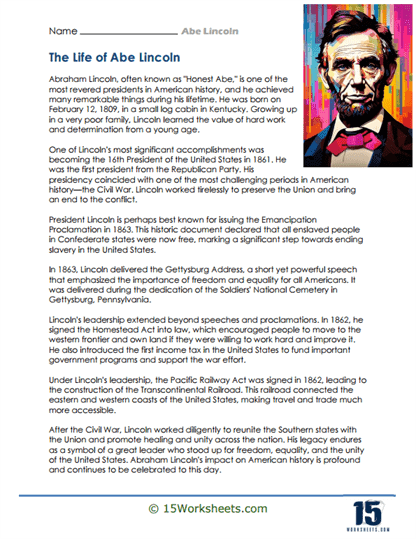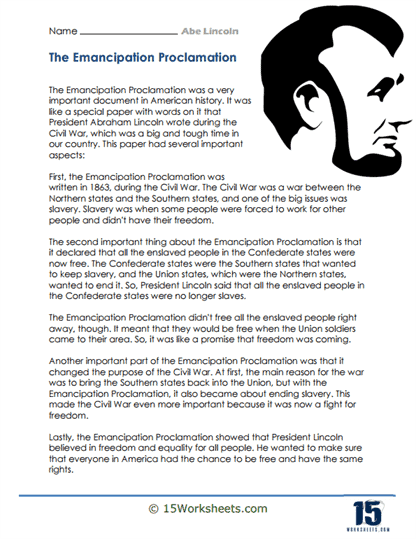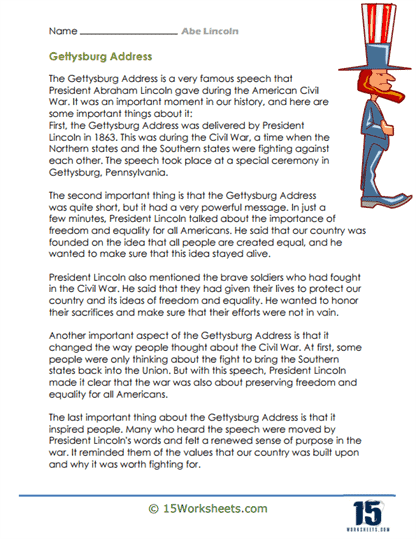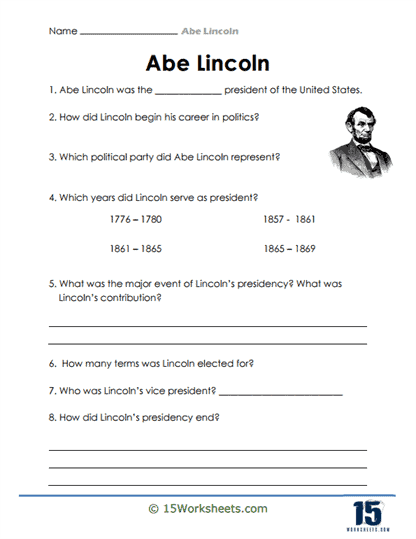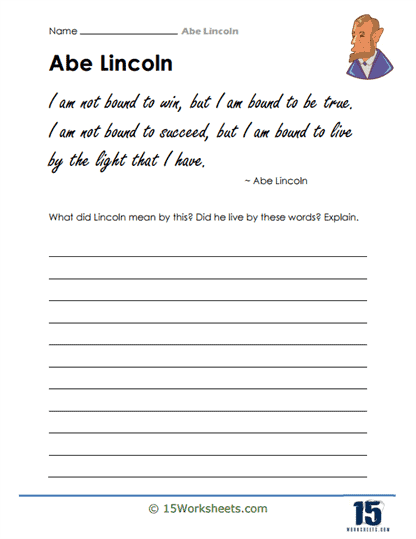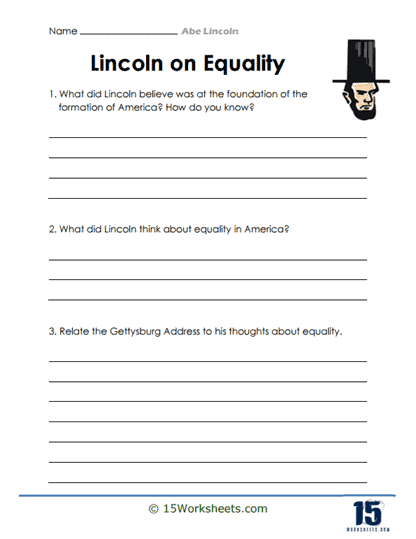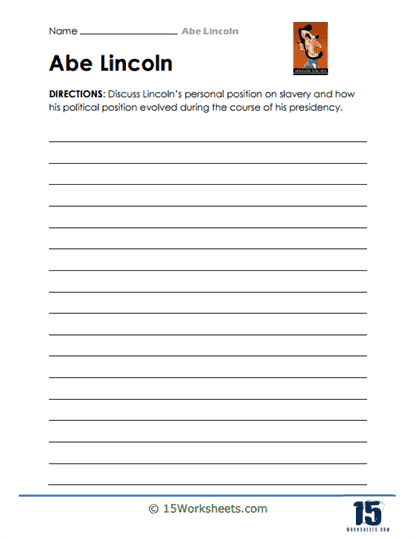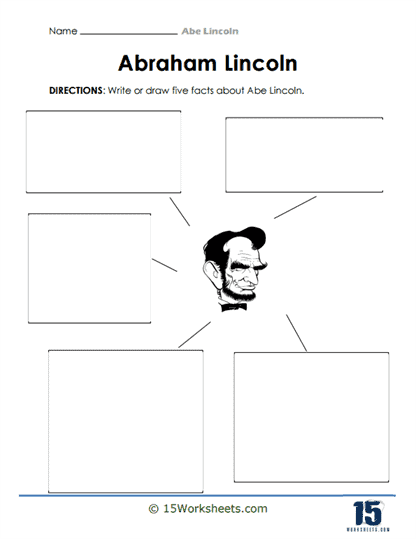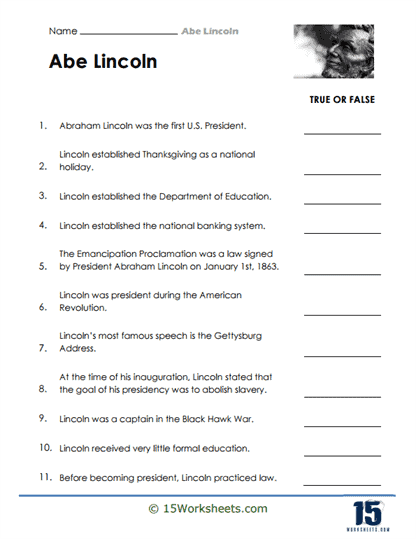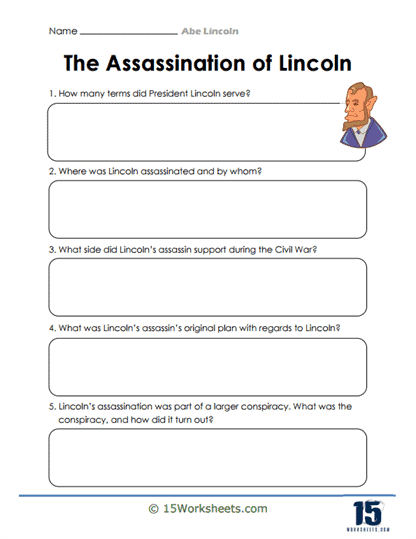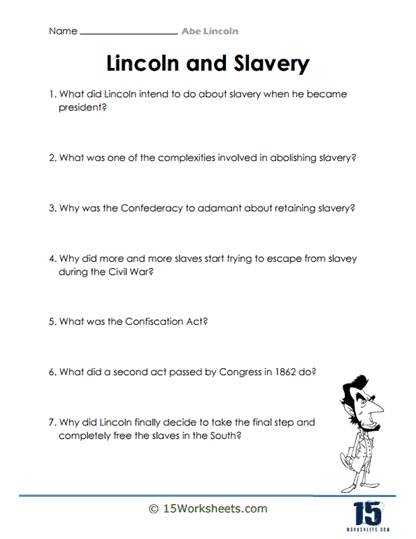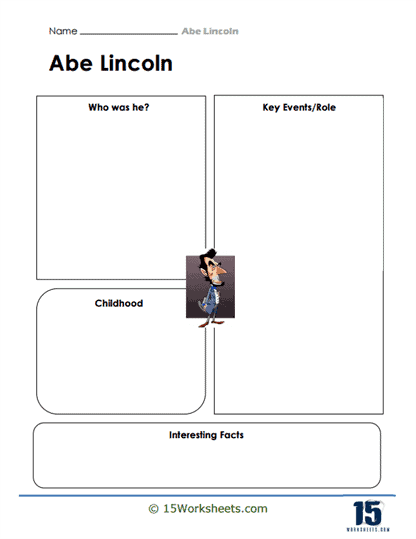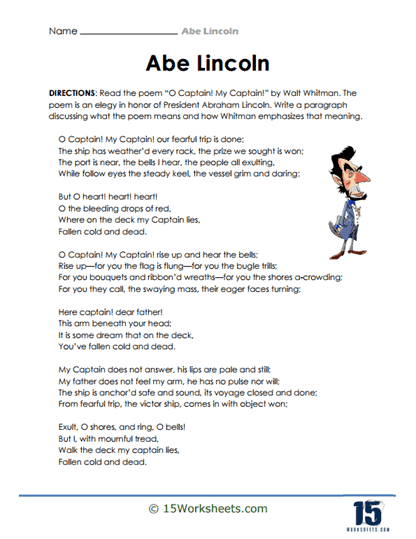Abe Lincoln Worksheets
About These 15 Worksheets
Our Abraham Lincoln worksheets were created to teach students about the life, achievements, and historical significance of Abraham Lincoln, the 16th President of the United States. These worksheets encompass a range of activities and exercises, each aiming to deepen the understanding and appreciation of Lincoln’s role in American history. Below, we will describe the different types of exercises found in these worksheets and elaborate on the importance of learning about Abraham Lincoln in students’ lives.
These worksheets not only impart historical knowledge but also foster critical thinking, ethical reasoning, and personal development. Lincoln’s enduring legacy makes him a compelling subject of study, offering timeless lessons that are relevant in students’ lives today.
Types of Exercises
Biographical Reading Comprehension – These exercises typically include a short biography of Lincoln, covering his early life, political career, presidency, and his role in the Civil War and the abolition of slavery. Students answer questions to test their understanding of the text. These tasks involve creating or completing timelines of Lincoln’s life, highlighting key events like his birth, the Lincoln-Douglas debates, his election as president, the Emancipation Proclamation, and his assassination.
Fact and Opinion Sorting – Students are given a list of statements about Lincoln and asked to categorize them as facts or opinions. This exercise helps in developing critical thinking skills. With the integration of technology in education, some worksheets may include interactive elements like online quizzes, digital timelines, or multimedia presentations.
Quote Analysis – Worksheets often include famous Lincoln quotes for students to analyze and interpret, understanding their context and significance. Students might be asked to write essays on various topics, such as Lincoln’s leadership qualities, his impact on American history, or a comparison with other historical figures.
Mathematical Connections – Some worksheets link Lincoln’s life to math, such as calculating the number of years since certain events in his life or using statistics related to the Civil War.
Importance of Learning About Abraham Lincoln
Understanding American History – Lincoln’s presidency coincided with one of the most tumultuous times in American history. Learning about him helps students understand the Civil War, the struggle to abolish slavery, and the broader context of American history. Lincoln is celebrated for his leadership qualities—his ability to unite a divided nation, his eloquence, and his commitment to principles of equality and democracy. Studying his life can inspire students to develop their leadership skills.
Moral and Ethical Lessons – Lincoln’s life and decisions, particularly regarding slavery and civil rights, offer valuable lessons in ethics and morality, emphasizing the importance of doing what is right, even in the face of adversity. Engaging with Lincoln’s speeches, writings, and decisions encourages critical thinking and debate skills, as students analyze and discuss complex historical and ethical issues.
Cultural Literacy – As a central figure in American history and culture, knowledge about Lincoln is part of being culturally literate, enabling students to understand references in literature, media, and public discourse. Lincoln’s story of rising from humble beginnings to the presidency is a powerful example of personal growth and perseverance, teaching students about the value of hard work, education, and resilience.
Who Was Abraham Lincoln?
Abraham Lincoln was a very important person in American history. He was born on February 12, 1809, in a log cabin in Kentucky, USA. He grew up in a poor family and had very little formal education, but he loved reading and learning on his own.
As he got older, Abraham Lincoln became a lawyer and later became involved in politics. He became the 16th President of the United States in 1861, just before the Civil War started. The Civil War was a big and terrible war between the northern states and the southern states over issues like slavery and states’ rights.
President Lincoln was known for his leadership during this tough time. He wanted to keep the United States united and free for all people, so he worked hard to end slavery. He also gave a famous speech called the Gettysburg Address, where he talked about the importance of equality and freedom.
Abraham Lincoln is most famous for signing the Emancipation Proclamation in 1863, which helped to free enslaved people in the southern states. This was a big step towards ending slavery in the United States.
Sadly, President Lincoln was assassinated in 1865 while he was watching a play at Ford’s Theatre in Washington, D.C. His death was a great loss to the nation, but his legacy lives on.
Abraham Lincoln’s legacy is that he helped to end slavery and preserve the United States during a very difficult time. He is remembered as one of the greatest American presidents, and his face is even on the penny and the five-dollar bill. People still look up to him for his wisdom, leadership, and his belief in equality and freedom for all.

